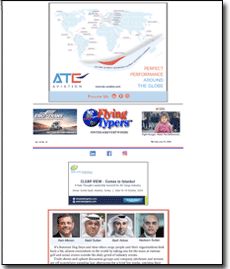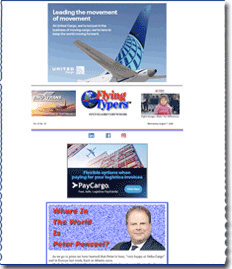
 |
 |
 #INTHEAIREVERYWHERE |
| Vol. 23 No. 34 | Wednesday August 14, 2024 |
| |
 |
Jeffrey Robin van Haeften is a distinguished professional with a robust educational journey, which includes the IMD in Lausanne, the London Business Schooland the Nyenrode Business University. Senior Vice President of Cargo Commercial Worldwide at Emirates SkyCargo, Jeffrey is responsible commercial vision and strategy for the cargo division. Prior to his tenure at Emirates, Jeffrey held key positions at CEVA Logistics and DHL Global Forwarding, both enterprises in leading positions within the freight forwarding community. FlyingTypers engaged Jeffrey van Haeften in a conversation spanning through success (obviously) and second thoughts: it all started from explaining the possible confusion about SkyCargo’s role in Logistics and its importance. This is what van Haeften’s wanted to express in this regard to the layman and/or the newbie, possibly imagined as his younger self: “'The World Works Better with Emirates SkyCargo' is Emirates’ most recent advertising campaign, highlighting the crucial role of air cargo in making the world a better place: putting brides and would-be fiancés, patients and doting family members, pet-owners and children, all front and centre of the scene to help the public understand the essential role logistics plays in their lives every single day, and the significant impact an organization like Emirates SkyCargo can have all over the world. Working at Emirates SkyCargo, a leading partner for the world’s supply chains, is one of the most exciting, direct ways of making such experience. Maybe it does not always start as a bed of roses, but . . . embracing the temporary discomfort of something new, broadening your perspective and stepping outside of your comfort zone are essential. This is the advice I offer to those who are just joining the industry. This is an essential skill in life, not just in our business.” FT was impressed by his interlocutor’s enthusiasm with regard to air cargo, in particular considering Jeffrey’s background in the forwarding sector. We mutually observed that globally the logistics industry grapples with a scarcity of labour, which will dictate the needs of the future in a landscape where the situation seems unlikely to improve. “The potential deployment of AI-powered robots to work in warehouses could solve the current workforce challenges. On the other hand, by introducing innovative technology and elevating our facilities with cutting-edge tools, we will attract the best talent on the market. There is a growing need for technology and digital tools to help accelerate air cargo and streamline global supply chains. AI and machine learning algorithms offer opportunities for air cargo companies to refine route planning, implement predictive maintenance strategies for their fleet, and improve overall operational efficiency. Such technologies can also help monitor environmental conditions, such as temperature and humidity, in real-time. This ensures the safe transportation of sensitive cargo, such as pharmaceuticals and perishable goods, while also providing valuable data insights for continuous service improvement.”
|
 |
Here is one of those increasingly rare people among us today who delivers a welcome amount of excitement, interest, energy and enthusiasm. After some words with the United Airlines Cargo Vice President Cargo Sales EMEI, based in Amsterdam it is clear that “Fast Jacques Leijssenaar has a pizzazz”, that’s what this effusive guy has . . . We shall give you “science fiction, double feature”, two sides of Jacques’s character, the elaborate accomplished airline spokesperson and the straight to the point Dutch guy who prefers to get the job done with few words. Jacques Leijssenaar is Vice President, United Cargo EMEIA for United Airlines. He is responsible for all aspects of United Cargo's activity in the EMEIA region and plans and directs the work of United Cargo's team of sales, operations, and revenue management professionals in the region. Time ago, right out of the gate, Jacques said something all of us should perhaps hear again, or for the first time: “It’s not about whether a dime on the ground is worth your effort, it’s about whether you are willing to pick it up and make something out of it. If you sit in the office all day waiting for the phone to ring, pretty soon you’ll be out of business!” If you think that Mr. Leijssenaar comes out of the chute at a full gallop for United Cargo, you would be right. Top priority for UA Jacques as Autumn approaches and he keeps an eye on Summer 2024 is always getting close to the customer: “My top priority is to talk, talk, talk with our customers. To connect with them as often as possible to learn how we can be of the most benefit to them, and of course be available for them whenever they need us. The number one rule of creating and maintaining a great cargo business is to deliver what you promise. We keep on saying yes and we will adapt quickly to changing market dynamics. I hope that we have a clear image in the market: we are approachable, solution driven, we price market conform and we deliver what we promise. In our customer/forwarder/airline model, none of the three parties are more important than any other, and the model isn’t viable unless all three work together and respect each other’s role.” Sante Parole (holy words), a friend of mine from Turin would say! “Yes, I believe in the traditional relationship. All our business is currently forwarder driven. Export and import are complex processes without uniform global rules or regulations, where forwarding expertise is crucial. Anticipating on environmental pressure, consolidation will be more crucial than ever. “As international shipping grows more and more complex, it’s vital to have experts involved that can coordinate all the details for customers—specialists that know all the nuances of documentation and regulation. In addition to playing that role for customers, of course, forwarders’ consolidations allow customers to benefit from attractive rates they could never obtain themselves. Collaboration Is Key!” Another title for the FT? Who knows? “From the airline perspective, I really appreciate the collaboration of forwarders and their 24/7 service mentality. I know how we work together every day on countless shipment issues of which customers are not aware: because we solve it together before it becomes a problem.” United Cargo business developed in 2024 and the rest of the year could see differences in different regions. “The European carriers channel more Asian freight via their hubs into the U.S., so the traditional capacity surplus in summer has a stabilizing effect. I also expect that freighter capacity will be swapped to the Asian routes for the winter period. We expect that the south European countries will keep on developing further where the north European markets staying flat. We notice an increased number of big projects, originating from ocean freight. We enhanced our commercial desk to accommodate these requests.” Talking of successes, new destinations, enhanced service offerings and impact of increased capacity. More questions, terse answers: United Cargo’s advantages in Europe? “Via pipelining we connect all our European stations and can offer limitless solutions.” How have recent numbers impacted your thinking? “The market is relatively stable considering all the negative impulses in Ukraine and Israel, but we are alert. The PMI’s are positive.” Can air cargo help others? “We proofed we could adapt very quickly during COVID. Especially in crises situations there is an immediate need for airfreight.” How About The Next Generation: “We’re competing with every other industry for talented and ambitious people, so we need to take steps to make air cargo an attractive choice. The top people entering the workforce these days, or those looking to make a career move, want the responsibility to create change and the power to make important decisions. The days are over of joining a company or an industry when you’re young and working at it full-time until retirement. Many new talents want the option to choose which temporary assignments they will accept and to ‘rent themselves’ to several customers at the same time. I think our industry needs to be open to this attitude to attract the most creative thinkers. I like people who are curious and dare to take risks. My motto is: there is always a solution and you will be surprised how many people are willing to helping you when you try to do good.” Keep The Change: “Digitalization will help the industry advance, but I notice a trend in the lack of knowledge of air cargo principles. Given the pressure on labour we should also focus on robotization and standardization in the handling process. In my opinion, airfreight will transition to a new way of selling services. In place of the current design of products with fixed features will be a base service with an ‘à-la-carte’ menu of add-ons. This will be directed by new shippers for whom the present product offering is too rigid—those who want to combine elements in ways not possible now. Starting from the base product, extras will be available like expedited routings, pickup and delivery, enhanced monitoring with on-board devices, elevated security protection, etc. The airlines’ challenge will be designing their offering, then delivering it operationally so that each customer will get exactly the services they book. Just keep everyone in the loop and deliver the news, good or bad, before someone else does. Pick up the phone, pay a visit, and be up front at all times—that must be the baseline policy. Also, when things work, be sure and give credit where credit is due,” Jacques insists. On the Table: “It’s about what UA brings to the table for shippers. We always have a solution!” Fast Jacques said. “Our people are dedicated and care about their business. Of great benefit is United’s extensive network, where we can offer direct service between all major European cities and the USA. Look, we understand fully that our service must not only meet, but exceed the need. Also, that United Cargo must deliver as promised and be very transparent up and down the line for everyone. Our customer experience is geared to work as near to perfect harmony as possible, with situations including delivering to market against the most strenuous deadlines, no excuses.” What Can Air Cargo Do Better? “Creating responsibility in the job and empowering people to make decisions is a rule air cargo should live by. Air cargo in the 21st century will continue to develop even more as an ‘à-la -carte menu’ of fixed products, services, and features. Air Cargo needs to continue creating responsibility in the job and empower people to make decisions. Also, I believe that currently in some quarters air cargo product offerings are too rigid. The challenge is to be flexible operationally so that the customer gets and pays for exactly what is booked. All of this takes talent and imagination and long-term determination to do whatever it takes to be a dependable, expansive air cargo resource. “And that,” Fast Jacques assures, “is United Cargo baseline business every day.” If you were in Jacques’ shoes, what would else you say? So much for double feature science fiction, this is their business every single day of the week! GDA/MLS |
|
|
Some of our readers know we as a family have been particularly affected by the recent events in Bangladesh. We have intimate connections and we are still trying to understand how the situation will evolve to put our minds to rest. There is also a business aspect in this experience and this is the point we wish to make for our readers’ information. Reaching out to our contacts we happily received information from Thomas Bayes, (above) Vice President Asia at EMO Trans, Inc. Corp in Irving, Texas, who was among the first ones to reply. This is what he reported regarding the Asian country, which falls within his portfolio: “The Bangladeshi situation has affected our day-to-day operations over the past few weeks, with the curfews put in place, protests on the streets and the internet shutdown. With Bangladesh being a heavy ocean export market, the port of Chittagong is heavily congested at this time, and they are starting to see a buildup of vessels at anchor off the coastline. Factories had been shut down as workers were joining the protest as well as not able to get to and from the factories with the mass demonstrations. “The good news is that, as of now, EMO Bangladesh has reopened and is back to full operations, with internet being fully turned back on, and factories all reopened. As the interim government was being put in place, Nobel Peace Prize Laureate Muhammad Yunus was recently appointed as Chief Advisor and this is a significant window of hope for the future. Our team, under the leadership of our MD Noor Alam Siddique, did an incredible job during this difficult time to ensure that they could do everything possible, to have day-to-day activities on monitor for our customers.”
So we hear that there has been some understandable anxiety, but the situation seems to be under control, if not back to normal. We took advantage of Tom’s politeness and continued our analysis asking for more information about the situation of his business. “Overall, for my Asian region we are very pleased with how things have been going for the first half of this year. We have had some challenges with rising cost, space availability and port congestions in most of the region, but we did all that was possible to ensure our customers were provided with the best possible service, along with competitive pricing. We are starting to see the port congestions improving and rates slightly getting better over the past few weeks on the ocean side. However, on the air side the rates are holding strong right now. Going into the 4th quarter we will have to see how this trend holds up. We are also expanding in a few countries this month, specifically in China with our 11th Branch office opening, as well as our 7th branch office in India opening this month, and we will continue to focus on expanding our EMO Flag in areas alongside our customers’ requirements.” We cannot, but rejoice hearing the evident success of our friends in EMO Trans, in particular in an area that seems to have gone through changes that could have been more worrisome. Let us just wait for a few more days to say that “all’s well that ends well”, but this is our hope and indeed our expectation. Geoffrey Arend |
 |
If
You Missed Any Of The Previous 3 Issues Of FlyingTypers Access complete issue by clicking on issue icon or Access specific articles by clicking on article title |
||
 Vol.
23 No. 31 Vol.
23 No. 31Emirates SkyCargo New Positions Chuckles for July 15, 2024 Schiphol—Why Not The Best? Are You Having Any Fun? |
 Vol. 23 No. 32 Cassation For Air Freight Forwarders Chuckles for July 25, 2024 IATA CASS Ready For Primetime? |
 Vol.
23 No. 33 Vol.
23 No. 33Where In The World Is Peter Penseel? Eduardo Del Riego Changing The Way To Pay Cargo Chuckles for August 7, 2024 AIFBA TSA Meet August 20 Happyfull Golf At JFK August 15 |
Publisher-Geoffrey Arend • Managing
Editor-Flossie Arend • Editor Emeritus-Richard Malkin |
Send comments and news to geoffrey@aircargonews.com
|